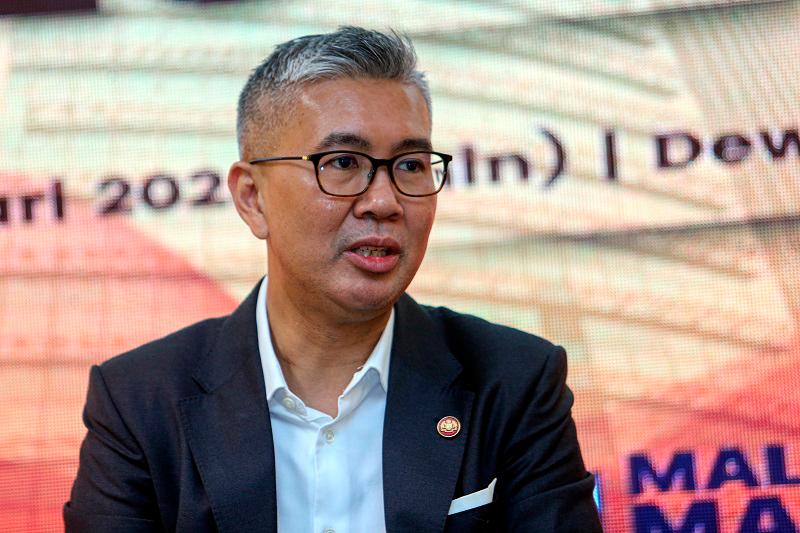KUALA LUMPUR: Investments in ASEAN can be significantly increased by effectively leveraging three megatrends, said Investment, Trade and Industry Minister Tengku Datuk Seri Zafrul Abdul Aziz.
As ASEAN continues to integrate into the global economy, it must navigate the significant impacts of global megatrends, which are multi-dimensional and varied, he said.
Three key trends that are particularly relevant are derisking or deglobalisation, the global race to net-zero emissions, and digital transformation, Tengku Zafrul said in his keynote address at a forum on “Expectations of Malaysia’s upcoming chairmanship of ASEAN” which was organised by the ASEAN Business Club here today.
Malaysia, as the ASEAN chair next year, will set the regional integration agenda for the grouping with the launch of the ASEAN Community Vision 2045 during its chairmanship.
On the first trend of derisking, Tengku Zafrul said ASEAN has the potential to become the epicentre of the next phase of growth in the Global South.
“Investors, exporters, countries and economic blocs must carefully position themselves in a multipolar world where the new power equilibrium or world order remains uncertain. The shifting geopolitical landscape, including trade tensions and changing alliances, could drive ASEAN’s increasing trade and investment flows,” he said.
According to him, many ASEAN dialogue partners, including India, China, the European Union and the United States, are revising their outlook and commitment to strengthen or expand trade and investment ties with ASEAN, particularly in emerging areas of growth.
“Countries such as Canada, the Gulf Cooperation Council, and Switzerland are also seeking to fortify their economic ties with ASEAN,” he said.
While this trend enhances ASEAN’s ability to shape the global economic landscape, he said ASEAN, and by extension, Malaysia, must be firm on its neutrality and independence.
“We must remain a nonaligned, open trading region for all,” he stressed.
On the second megatrend of global race to net-zero, Tengku Zafrul said it presents new investment and trading opportunities centred around a greener future, including carbon credits, certificates, currents, or charging capabilities
He said Malaysia is emerging as a leader in the areas of carbon neutrality and circular economy.
While many ASEAN member states are increasingly integrating ESG (environmental, social, and governance) considerations into their operations, others face challenges due to a lack of capacity, he said.
Therefore, the Ministry of Investment, Trade and Industry (MITI), which will lead Malaysia’s chairmanship in the economic pillar, aims to drive ASEAN-wide projects that facilitate regional sharing of expertise in green technology, supporting ASEAN countries that find the sustainability journey more challenging, he said.
To accelerate decarbonisation and achieve a carbon-neutral economy, ASEAN has developed the ASEAN Strategy for Carbon Neutrality. Additionally, the ASEAN Framework for Circular Economy aims to improve resource efficiency, economic resilience, and sustainable growth.
“Compliance with these frameworks by businesses will directly increase market opportunities and the green competitiveness of ASEAN products and services worldwide,” he said.
On the digital transformation megatrend, he said that while ASEAN countries are investing in digital infrastructure to enhance connectivity and drive economic growth, a forward-looking ASEAN Digital Economy Framework (DEFA) – currently being negotiated – is key for regional digital integration.
“This will foster inclusive growth and development,” he explained.
He also said that digital transformation and innovation are central to ASEAN’s reindustrialisation efforts.
“Countries like Malaysia, Singapore, Thailand, and Vietnam are investing in automation, artificial intelligence, and the Internet of things to boost industrial capabilities,” he said.
Tengku Zafrul also said that beyond inter-governmental support from ASEAN members, the success of Malaysia’s chairmanship in 2025 will require robust support from the private sector, including business players and industry leaders.
“I urge all of you to support Malaysia’s ambitions during the ASEAN chairmanship in 2025.
“We strongly believe that consistent engagement with the business community is essential. We welcome a collaborative approach to ensure our ongoing work within the ASEAN framework aligns with business needs and global standards,” he added.
This year, Laos is holding the ASEAN chairmanship. Following Malaysia in 2025, the chairmanship will be handed over to the Philippines in 2026.









